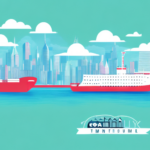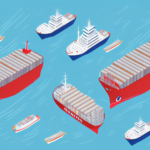What Does FTL Mean in Trucking? A Comprehensive Guide
As businesses continue to expand and grow, the need for efficient and reliable transportation becomes increasingly critical. Full Truckload (FTL) shipping has emerged as a popular option for businesses to transport their goods across the country. In this comprehensive guide, we will delve into what FTL means, its benefits, factors to consider when choosing FTL shipping, the types of cargo typically transported via FTL trucking, best practices for successful delivery, and the future of FTL trucking, including trends and innovations to watch out for.
Understanding the Basics of Full Truckload (FTL) Shipping
FTL shipping refers to a shipment mode where the entire cargo space of a truck is utilized to move goods from one destination to another. Unlike Less than Truckload (LTL) shipping, where cargo from multiple shippers is combined to fill a single truck, FTL shipping dedicates one truck to a single shipper. This is particularly beneficial for businesses with large volumes of goods, as it eliminates the need to share space with other shippers, thereby reducing the risk of damage to goods.
Another advantage of FTL shipping is its cost-effectiveness for businesses transporting large quantities of goods. Since the entire truck is dedicated to one shipment, the cost per unit of goods can be lower compared to LTL shipping, where costs are shared among multiple shippers. Additionally, FTL shipping is often faster than LTL shipping, as there are no additional stops to pick up or drop off other shipments along the route.
Key Benefits of FTL Shipping for Businesses
Faster Delivery Times
FTL shipping is typically faster than LTL shipping because the truck travels directly from the shipper to the receiver without intermediate stops. According to the Bureau of Transportation Statistics, FTL shipments can reduce transit times by up to 20% compared to LTL shipments.
Enhanced Security
With FTL shipping, goods are not shared with other shipments, providing a higher level of security. This minimizes the risk of theft and damage, ensuring that products arrive in optimal condition.
Cost-Effectiveness for Large Shipments
For businesses moving large volumes of goods, FTL shipping can be more cost-effective. Businesses are charged a flat rate for the entire truckload, irrespective of the cargo's weight, allowing for predictable budgeting and potentially lower overall costs per unit.
Better Control Over Shipments
FTL shipping offers businesses greater control over their shipments, including the ability to choose specific pickup and delivery times. This control facilitates better planning of inventory and production schedules, enhancing overall operational efficiency.
Factors to Consider When Choosing FTL Shipping
Cargo Size and Weight
Businesses must assess whether their cargo size and weight are suitable for FTL shipping. FTL is ideal for large, heavy shipments that would otherwise require multiple LTL shipments.
Distance and Delivery Timeline
The distance between the origin and destination plays a crucial role in determining the cost-effectiveness of FTL shipping. FTL is generally more economical for longer distances, whereas LTL may be preferable for shorter routes.
Budget Considerations
Businesses should evaluate their budget to determine if FTL shipping aligns with their financial goals. While FTL can be cost-effective for large shipments, it may not be the best option for smaller shipments due to higher absolute costs.
Security Requirements
For high-value or sensitive goods, the enhanced security provided by FTL shipping is a significant factor. Businesses may also consider additional security measures such as GPS tracking or security seals to ensure the safety of their cargo.
Environmental Impact
FTL shipping can have a different environmental footprint compared to LTL shipping. Businesses concerned with sustainability may opt for carriers that use fuel-efficient or alternative energy trucks to reduce emissions.
Comparing FTL Shipping with Other Shipping Options
FTL vs. LTL Shipping
While FTL is ideal for large shipments, LTL shipping is better suited for smaller loads. LTL allows multiple shippers to share space within the same truck, making it a more cost-effective option for businesses with smaller or less frequent shipments.
Reference: American Trucking Associations
FTL vs. Intermodal Shipping
Intermodal shipping combines multiple modes of transportation, such as rail and truck, to move goods. This method can be more cost-effective and environmentally friendly for certain routes and cargo types but may involve longer transit times compared to FTL.
Reference: U.S. Department of Transportation
FTL vs. Air Freight
Air freight offers the fastest delivery times but is significantly more expensive and has weight restrictions that make it unsuitable for large or heavy shipments. FTL remains the preferred option for ground transportation of large volumes.
Reference: International Air Transport Association
Common Types of Cargo Transported via FTL Trucking
Dry Goods
FTL trucking is commonly used to transport dry goods such as electronics, furniture, and appliances. These items often require secure and direct transportation to prevent damage and ensure timely delivery.
Refrigerated Goods
For temperature-sensitive products like food and pharmaceuticals, FTL refrigerated trucking provides the necessary climate-controlled environment to maintain product integrity during transit.
Reference: FS1 Logistics
Hazardous Materials
FTL trucking is also employed to transport hazardous materials safely. Specialized carriers equipped with the necessary certifications and equipment ensure compliance with safety regulations.
Reference: Pipeline and Hazardous Materials Safety Administration
Construction Materials
Construction materials such as lumber, steel, and concrete are frequently transported via FTL trucking due to the large quantities and the need for specialized handling equipment.
International Shipments
FTL trucking is utilized for international shipping, providing a cost-effective and efficient method for transporting large or oversized items across borders.
Reference: U.S. Customs and Border Protection
Best Practices for FTL Shipping: Tips for Successful Delivery
Accurate Inventory Tracking
Maintaining precise inventory records is essential to avoid delays and ensure timely delivery. Implementing advanced inventory management systems can enhance accuracy and efficiency.
Reference: Investopedia
Proper Packaging
Appropriate packaging safeguards goods from damage during transit. Businesses should use high-quality materials and follow best practices for packing to ensure the integrity of their shipments.
Reliable Carriers
Partnering with experienced and dependable carriers is crucial for ensuring on-time delivery and providing real-time shipment tracking. Researching carrier reputations and reviews can aid in making informed decisions.
Advanced Planning and Scheduling
Scheduling shipments well in advance helps avoid last-minute rushes and ensures that cargo is picked up and delivered on schedule. Effective planning contributes to smoother operations and reduces the risk of delays.
Effective Communication
Maintaining clear and consistent communication with carriers is vital. Providing detailed information about the shipment, including weight, dimensions, delivery location, and any special handling requirements, facilitates a seamless shipping process.
The Pros and Cons of Using FTL Shipping for Small Businesses
Advantages for Small Businesses
Small businesses that need to transport large volumes of goods can benefit from FTL shipping's faster delivery times and greater control over shipments. These benefits can outweigh the higher costs associated with FTL shipping.
Disadvantages for Small Businesses
For small businesses with smaller shipments, FTL shipping may not be financially viable due to higher absolute costs compared to LTL shipping. In such cases, LTL shipping presents a more cost-effective alternative.
Reference: Business News Daily
How to Choose the Right FTL Carrier for Your Business Needs
Evaluate Carrier's Track Record
Consider the carrier's history of on-time deliveries and their experience in handling goods specific to your industry. A carrier with a strong track record is more likely to provide reliable service.
Assess Pricing Structures
Compare the carrier's pricing models to ensure they align with your budget. Transparent pricing without hidden fees is essential for maintaining cost-effectiveness.
Consider Safety Records
Review the carrier's safety records and the measures they implement to protect your cargo. A carrier with a robust safety protocol minimizes the risk of accidents and cargo loss.
Reference: Federal Motor Carrier Safety Administration
Prioritize Customer Service
Choose carriers that offer dedicated customer service teams to support you throughout the shipping process. Responsive customer service can address issues promptly and enhance the overall shipping experience.
Leverage Technology and Capabilities
Opt for carriers that utilize advanced technologies such as real-time tracking and automated systems. These technologies provide greater visibility into your shipments and streamline the shipping process.
Reference: Supply Chain Digital
The Future of FTL Trucking: Trends and Innovations to Watch Out For
Digital Transformation
The integration of digital technologies like GPS tracking, real-time communication, and automated documentation is revolutionizing FTL trucking. These technologies enhance efficiency, reduce costs, and improve delivery times.
Reference: Forbes
Automation and Autonomous Trucks
Automation is set to play a significant role in the future of FTL trucking. Autonomous trucks promise to increase efficiency, reduce human error, and lower operational costs. While widespread adoption is still in progress, pilot projects are demonstrating the potential of this technology.
Reference: MIT Technology Review
Sustainability Initiatives
Environmental sustainability is becoming a priority in the logistics industry. Carriers are increasingly adopting eco-friendly practices, such as using electric or hybrid trucks, optimizing routes to reduce fuel consumption, and implementing green logistics strategies.
Reference: GreenBiz
Integration of Blockchain Technology
Blockchain technology offers enhanced transparency and security in supply chain operations. By providing a decentralized ledger for tracking shipments, blockchain can reduce fraud, improve traceability, and streamline administrative processes.
Reference: IBM Blockchain
Adoption of Internet of Things (IoT)
The Internet of Things (IoT) is increasingly being integrated into FTL trucking to monitor vehicle performance, track cargo conditions, and enhance overall fleet management. IoT devices provide real-time data that can be used to optimize operations and improve decision-making.
Reference: Forbes Tech Council
Conclusion
Full Truckload (FTL) shipping is a reliable and efficient method for businesses to transport large volumes of goods across the country. FTL offers numerous benefits, including faster delivery times, enhanced security, and cost-effectiveness for large shipments. However, businesses must consider factors such as cargo size, distance, budget, and security requirements when choosing FTL shipping. By selecting the right carrier and adhering to best practices, businesses can optimize their supply chain operations and ensure the successful delivery of their goods. Looking ahead, advancements in digital technology, automation, and sustainability will continue to shape the future of FTL trucking, offering new opportunities for efficiency and innovation.






















